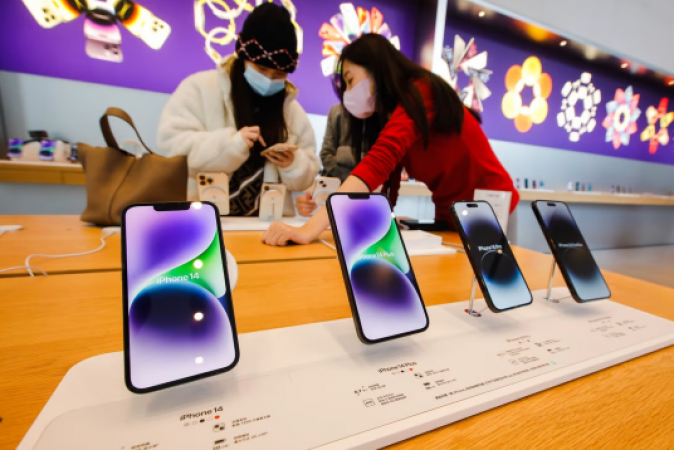
BEIJING: There are no winners in China's game of whack-a-mole, dubbed by the government a "dynamic zero-covid" that has ravaged the country's economy and brought growth to levels not seen in decades .
This was never more evident than when the largest iPhone factory in Zhengzhou began placing restrictions on workers, fearing a mass exodus.
Foxconn, the largest contract electronics maker in the world, has experienced problems with coronaviruses before. But this was the first time that Apple, the world's biggest technology company, was clearly feeling the deep impact.
Also Read: No prospect of recession India: Niti Aayog VC
The company predicted fewer shipments of the iPhone 14 Pro and 14 Pro Max than previously expected, and Foxconn also revised its fourth-quarter growth downward.
Zero-Covid is not a new thing for the people in China. It has been a part of his life for almost three years now. But the most recent outbreak in central Henan province was particularly ineffective.
Workers at Foxconn's top iPhone manufacturing facility complained about poor living conditions and fear of getting sick because of subpar medical care.
Foxconn is working hard to retain assembly line workers as the US enters its busiest shopping period of the year before the holidays. The manufacturer raised its daily cash bonus to 400 yuan (US$56) and offered a US$70 subsidy in an effort to woo some of its workers back.
Despite being just one company, Foxconn is strategically important to China because of its size and location in the electronics supply chains of the world's biggest tech brands. At its height, the Zhengzhou plant alone employed some 300,000 people.
The factory is an important local employer, so village activists began contacting former workers to persuade them to come back to work. Even veterans of the People's Liberation Army were encouraged by the regional Veterans Affairs office to work at a facility in a county.
Big tech companies are hedging their bets, but for now, China is still too important to supply chains for businesses to leave the market.
Also Read: 'Main threat' to World Heritage sites is climate change
Apple has already ramped up production in India, and rivals such as Samsung have long begun expanding their capabilities to other markets, with Vietnam being one of the most popular choices.
So far, the Chinese government has refused to give up on its virus-control measures. While it appears the world is headed for recession, it has acknowledged the damage done to the economy and promised more support to prevent a hard landing.
Zero-Covid, however, has only served as a catalyst for businesses to rapidly expand their supply chains outside of China as a result of growing geopolitical unrest, which increasingly affected many tech-related operations. Is.
The semiconductor industry has already been severely hit by the escalating US-China tech war, and tech companies are starting to feel the heat.
The US$12 billion Taiwan semiconductor manufacturing company's facility is still under construction, according to Apple CEO Tim Cook, who also noted this week that the company would buy chips from a plant in Arizona.
This information was released shortly after Apple announced that it was abandoning plans to buy memory chips from YMTC in China.
Mainland China has made strides in memory chip production, but its semiconductor factories are still unable to produce the sophisticated chips needed to power an iPhone.
YMTC was one of the hardest hit when Washington tightened export rules once more in October as the US considered blacklisting the company.
The semiconductor industry's struggle shows how the tech war and zero-Covid are hurting the world's second-largest economy, which had already slowed before the pandemic.
In October, the domestic chip industry experienced its largest ever monthly decline, and in the first ten months of the year, the decline in chip imports accelerated.
It is no coincidence that China's semiconductor hub Shanghai suffered a significant disruption earlier this year due to a city-wide lockdown.
Shanghai-based Semiconductor International Manufacturing Corp., the nation's largest chip maker, also predicted that US export sanctions would have an impact on fourth-quarter revenue.
Also Read: The global climate responsibility map is revised by COP27
However, China continues to dominate the world's manufacturing industry. Beijing may be betting that investment will resume after zero post-Covid restrictions are lifted, a day that is still far away, but geopolitical tensions will not disappear any time soon.
The trend of gradually diversifying supply chains away from China continues, regardless of whether Apple, Samsung, or another multinational conglomerate is carefully managing their brands.
Plunges down
Workers at the largest iPhone factory in the world, operated by Foxconn Technology Group in the city of Zhengzhou in central China, have turned to social media for support as a result of the campus's strict pandemic control measures, which have been in place since last week to contain a small Covid-19 outbreak.
On websites like microblogging site Weibo and TikTok's Chinese equivalent Douyin, employees vented their rage by posting texts, pictures, and videos of chaotic scenes. Many expressed worry that cases may have gone unreported, putting workers at risk of infection.